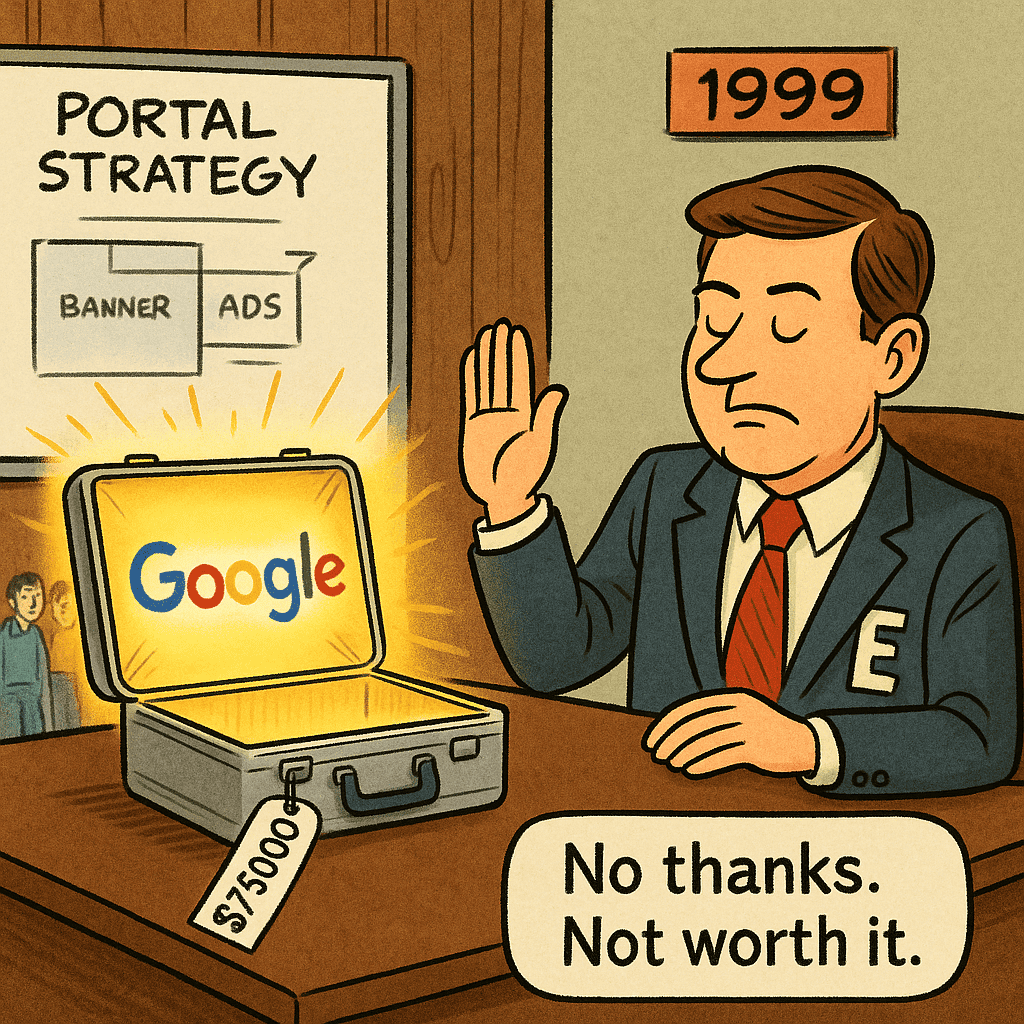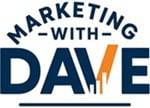Brief Summary

In the late 1990s, web portal Excite had the chance to acquire Google’s search technology for under $1 million. Excite’s executives, however, worried that Google’s superior search would cause users to leave the Excite site faster, hurting ad revenues.
Believing the new search wasn’t significantly better than their own, Excite walked away from the deal. In hindsight, this decision, essentially passing on Google, is often cited as one of the worst business mistakes in tech history. Google went on to become a trillion-dollar giant, while Excite faded into obscurity.
Company Involved
Excite was once a leading internet search portal and content site in the 1990s. The company, founded in 1994 and booming during the dot-com era, was approached by the young founders of Google (then a Stanford project called BackRub) about a potential acquisition. Excite’s handling of that offer is the focus of this case study.
Marketing Topic
- Strategy
- Advertising
- Customer Experience
Public Reaction or Consequences
At the time, Excite’s decision to reject Google’s offer went largely unnoticed by the public – the negotiations were behind closed doors. But as Google’s success became apparent, this story entered tech industry lore as a legendary blunder. Analysts and bloggers frequently point to Excite’s choice as a cautionary tale of short-sighted leadership. The consequences for Excite were severe: it quickly fell behind in the search market, lost users to Google and other rivals, and never recovered. By 2001, Excite’s parent company went bankrupt amid the dot-com bust, and in 2004 what remained of Excite was acquired by Ask Jeeves (now Ask.com). In contrast, Google transformed into one of the world’s most valuable and dominant tech companies.
Why It Matters Today
- Demonstrates the perils of short-term thinking. Excite worried about immediate ad revenue and failed to see the long-term value of superior search technology.
- Highlights the importance of embracing disruptive innovation. Ignoring or underestimating a breakthrough (like Google’s algorithm) can leave a company obsolete.
- Reminds marketers and executives that user experience is king. Trying to keep users “stuck” on your site for ad views backfired – ultimately, delivering the best user solution (even if it changes your business model) is critical for sustained success.
3 Takeaways
1. Don’t let short-term metrics blind you – Focusing solely on current revenue (page views, ad clicks) can cause you to miss transformational opportunities.
2. Be willing to adapt or partner – Embracing new technology early, even if it disrupts your existing operations, may secure your company’s future.
3. Prioritize product quality and user value – Delivering the best experience for customers will drive long-term growth, even if it means rethinking how you monetize.
Notable Quotes and Data
“The Stanford product was too good… If Excite were to host a search engine that instantly gave people information they sought… users would leave the site instantly. Since his ad revenue came from people staying on the site… using BackRub’s technology would be counterproductive.
“Larry Page actually insisted… that we would have to rip out all of the Excite search technology and replace it with Google… we concluded that… [the differences] really weren’t significant and we passed on the chance to buy it… I didn’t feel that that was a risk… I wanted to take.” – George Bell, former Excite CEO
In 1999, Excite declined to buy Google for roughly $750,000; by 2018 Google’s value was around $367 billion, while Excite was sold for just $343 million in 2004.
Full Case Narrative
Background: In the mid-1990s, Excite was one of the web’s top portals, offering search, news, email, and more. It was the sixth most-visited website in 1997, competing with the likes of Yahoo!, Lycos and AltaVista in the early search engine market. Google, meanwhile, began as an academic project (originally nicknamed “BackRub”) by Larry Page and Sergey Brin at Stanford University. By 1998-1999, Page and Brin had developed a radically better search algorithm and were looking for a way to commercialize it – or possibly sell it, so they could return to their studies.
The Offer: Google’s founders approached Excite in 1999, through venture capitalist Vinod Khosla (an early Excite backer), and offered to sell Google’s search technology for around $1 million. Khosla helped negotiate the price down to approximately $750,000 in cash plus some Excite stock. In essence, for well under $1 million, Excite could have acquired what would become Google. However, Larry Page had one major stipulation: Excite had to replace its own search engine with Google’s if the deal went through. Google’s team believed their algorithm would vastly improve Excite’s search results, but this condition meant Excite would be discarding its existing search technology and possibly some of its engineering team’s work.
Excite’s Perspective: Excite’s CEO George Bell and his team were hesitant. Internally, Excite ran tests comparing Google’s search results to their own. According to Bell, those tests did not show a dramatic difference at the time, and the team believed their results were not significantly worse in the eyes of users. Excite was also proud of its in-house technology and culture as a search company. Replacing their core search engine with Google’s was seen as a drastic step that could undermine morale and the company’s identity. Bell later recalled worrying that the cultural risk of swapping in Google’s technology was too high if the benefits seemed limited. Meanwhile, Page and Brin were primarily interested in selling so they could return to their studies at Stanford.
Moreover, an account described in journalist Steven Levy’s book In The Plex suggests Excite had a deeper concern: Google’s search worked too well. During a demo, Google (BackRub) produced extremely relevant results that would answer users’ queries quickly. Excite’s portal business model relied on “stickiness” – keeping users engaged on its pages to show them ads. If an ultra-efficient search engine sent people away faster, it could reduce ad impressions. From this viewpoint, adopting Google’s superior search might have threatened Excite’s advertising revenue. (Bell has disputed that this was a deciding factor, but it’s a narrative that spread widely.
The Decision: Ultimately, George Bell and Excite’s leadership rejected the Google deal. Even after the price was lowered and despite Google’s promise, Excite walked away in 1999. Bell gave Khosla and the venture capitalists the go-ahead to invest in Google instead, since Excite wouldn’t be taking it over. In hindsight, Bell acknowledged that as CEO it was his decision – and one that “in the end, of course, I did make”. At the time, however, he believed he was protecting Excite’s culture and stability.
Fallout: The consequences of passing on Google became apparent within a couple of years. The search landscape of the early 2000s shifted dramatically. Google continued to refine its search engine and began to attract millions of users, quickly outpacing older portals. Excite, on the other hand, struggled. The dot-com bubble burst hit Excite hard: in 2001 Excite’s parent company (Excite@Home) went bankrupt. The Excite portal changed hands, eventually being acquired by Ask Jeeves by 2004. By then, Google was on an explosive growth trajectory: it launched AdWords, set the standard for search advertising, and went public in 2004 with a market capitalization in the tens of billions. Excite, lacking a strong differentiator, faded from prominence. Its brand survived in a diminished form (today Excite.com still exists, owned by IAC, but it’s a minor web portal with no influence in the search market.
Analysis – Why Excite Said No: Why would a company refuse a deal that looks, in retrospect, like a no-brainer? Excite’s case shows how context and mindset matter. In 1999, $750,000 was a small price, but Google was an unproven startup with just a handful of employees. Excite was a well-known internet player; from their view, Google’s algorithm didn’t obviously blow away what Excite already had. Also, integrating Google implied admitting Excite’s own technology wasn’t top-notch. That was a hit to pride and could mean upheaval – possibly laying off parts of Excite’s engineering team or reallocating resources. Bell and his team likely thought they were making a prudent choice: why fix what isn’t broken, especially if it might disrupt your business?
There was also a prevailing portal strategy at the time. Portals like Excite and Yahoo were not just about search – they wanted to be one-stop destinations where users would stay and browse multiple services. A design that quickly shuttles users off to external sites (which Google’s search excels at doing) seemed counter to this strategy. In essence, Excite failed to anticipate how the internet would evolve from portal hubs to specialized tools. The very metric they prized, keeping users on-site, was rendered less important once search engines (and later social networks) proved that delivering what users want, fast, leads to success and monetization in other ways.
Lesson for Marketers: Excite’s missed opportunity underscores the risk of being too committed to an existing business model. Successful marketing and product strategy require balancing the current revenue model with forward-looking innovation. Excite’s leadership feared cannibalizing their own traffic and ad earnings; Google, by contrast, focused on superior user experience and figured out monetization (through search ads) later – capturing huge market share in the process. Marketers today can learn from this. Clinging to short-term gains or familiar practices often means forfeiting game-changing growth. In fast-moving industries, it’s often better to disrupt yourself before someone else does.
Timeline
1999: Google’s Larry Page and Sergey Brin offer to sell their search engine to Excite for roughly $1 million. Excite CEO George Bell turns it down, even after the price is reduced to about $750,000.
2001: Excite@Home (Excite’s parent company) files for bankruptcy as the dot-com bubble collapses.
2004: Google launches its IPO, rapidly becoming a dominant tech company. The same year, Ask Jeeves acquires Excite’s portal business for a reported $343 million.
Present: Google (now part of Alphabet Inc.) is a global technology leader worth over a trillion dollars, while Excite exists only as a vestigial web portal owned by IAC, with minimal traffic and influence.
What Happened Next?
Excite’s decision not to buy Google is a textbook example of a missed opportunity. After 2004, Excite’s brand drifted into irrelevance. It became one of several small sites under the IAC umbrella, and has not been a meaningful player in the internet industry for decades. Google, on the other hand, revolutionized digital advertising and online information access. By prioritizing a better search product, Google unlocked a business model (search ads based on intent) that far outgrew portal banner ads. Excite’s earlier concerns about losing ad revenue were ironic – Google figured out how to make search ads immensely profitable without needing to trap users on a portal. In the end, Excite’s legacy is largely as a cautionary tale. The company that once sat near the top of the internet hierarchy is now remembered primarily for the giant that “got away.”
One Sentence Takeaway
Being fixated on preserving an old business model can cause you to miss the next big thing – a costly mistake that no marketer or business leader wants to repeat.
Sources and Citations
TechCrunch – “When Google Wanted To Sell To Excite For Under $1 Million (And They Passed)” (2010)
CEO Today – “8 of the Worst Business Decisions Ever Made” (2018)
BusinessWire – “The World’s Worst Business Decisions” (2020)
